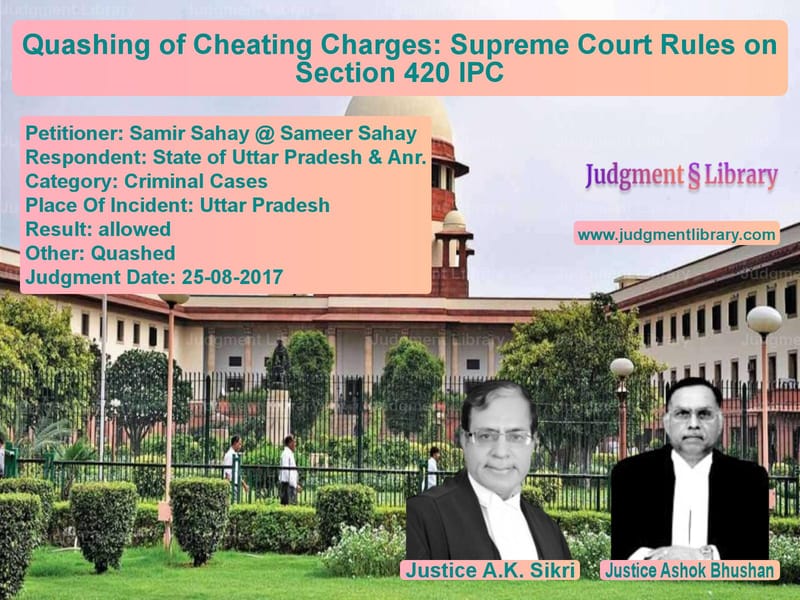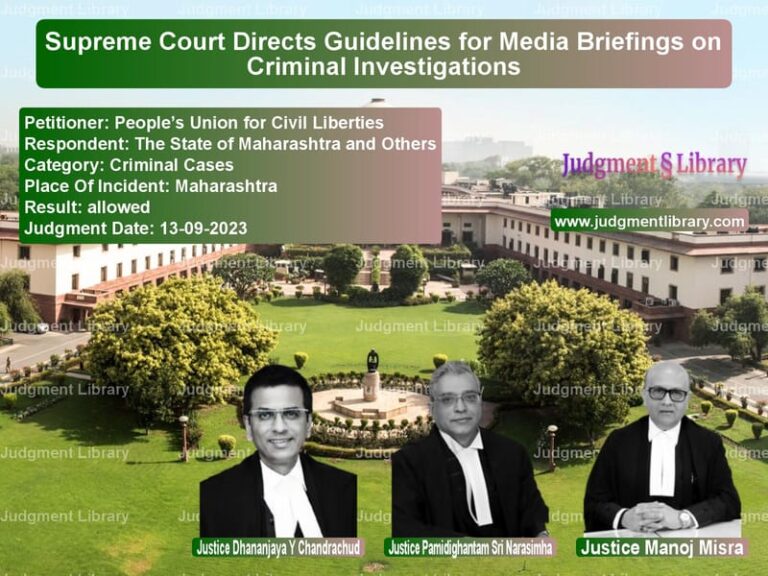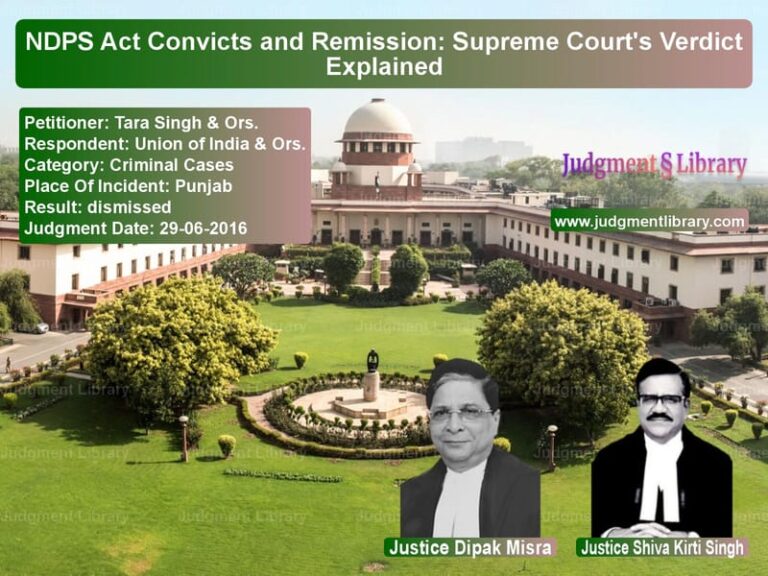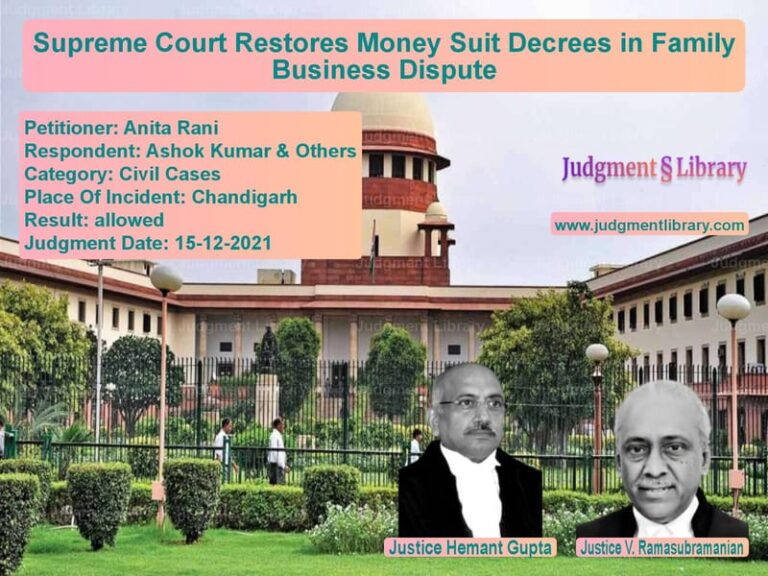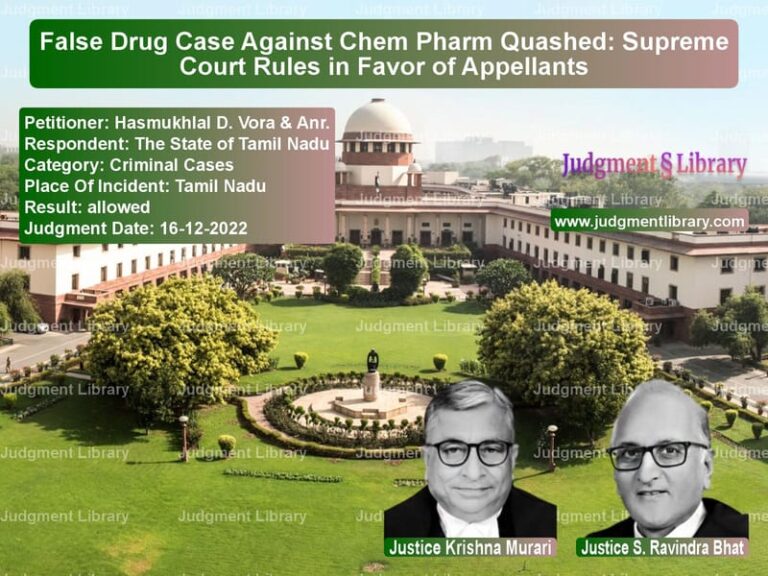Quashing of Cheating Charges: Supreme Court Rules on Section 420 IPC
The Supreme Court of India in Samir Sahay @ Sameer Sahay vs. State of U.P. & Anr. delivered a landmark ruling regarding the quashing of criminal proceedings under Section 420 of the Indian Penal Code (IPC). The Court ruled that when the fundamental ingredients of cheating are not met, a charge under Section 420 IPC cannot be sustained, and the accused must be discharged.
This case highlights the importance of proving fraudulent or dishonest intention at the time of inducement for an offense under Section 420 IPC. The Supreme Court set aside the orders of the Chief Judicial Magistrate and the Allahabad High Court, which had rejected the accused’s plea for discharge.
Background of the Case
The case arose from a financial dispute involving M/s Aneja Consultancy, a financial company founded in 1984. The father of the appellant, Major P.C. Sahay (Retd.), was employed as a branch manager at the company’s Fatehpur office. Several individuals, including the complainant Col. R.K. Singh (Retd.), deposited money in the company, believing it to be a safe investment.
The complainant and his wife deposited Rs. 86,000 in June and July 1997, based on alleged assurances given by Major P.C. Sahay. The company later faced financial difficulties and failed to return the investors’ money. On May 30, 1998, the complainant lodged an FIR under Section 420 IPC against the appellant and his father, alleging that they had induced him to invest in the company through false assurances.
The police conducted an investigation and filed a charge sheet in 2001 under Section 420 IPC. The Chief Judicial Magistrate took cognizance and rejected the appellant’s plea for discharge in 2007. The appellant then approached the Allahabad High Court, which dismissed his revision petition in 2016, leading to the present appeal before the Supreme Court.
Arguments by the Petitioner
The appellant, Samir Sahay @ Sameer Sahay, argued:
- The FIR lacked ingredients necessary to establish an offense under Section 420 IPC.
- The entire basis of the case rested on the fact that his father, Major P.C. Sahay (Retd.), had given assurances, not the appellant.
- The complainant himself had filed a consumer complaint against the company’s chairman and managing director but had not implicated the appellant.
- There was no evidence to prove that the appellant had any role in inducing the complainant to deposit money in the company.
- Merely accompanying his father at the time of assurance could not be construed as an act of cheating.
- The company itself had issued a public declaration in 1996 stating that only the owner was liable for repaying depositors.
Arguments by the Respondents
The respondents, including the State of Uttar Pradesh, countered with the following points:
- The complainant had alleged that both the appellant and his father were present at the time of inducement.
- The assurances given by the appellant and his father led to the deposit of Rs. 86,000.
- Section 420 IPC does not require that the accused be an employee of the company—any person who induces another to part with money through deception can be prosecuted.
- The trial court and the High Court had already found sufficient grounds to frame charges, and there was no justification for quashing the proceedings.
Supreme Court’s Observations
The Supreme Court bench, comprising Justice A.K. Sikri and Justice Ashok Bhushan, examined the legal aspects of the case and held:
“The ingredients of Section 420 IPC are not made out in the present case, either from the First Information Report or from any other material. From the FIR, the only allegation against the appellant was that he accompanied his father when the assurance was given.”
The Court further emphasized:
“There is no allegation that the appellant fraudulently or dishonestly induced the complainant to deposit money. A mere presence at the time of assurance, without active involvement in the inducement, does not establish cheating.”
The judgment cited legal precedents that define cheating under Section 420 IPC, including:
- Hridaya Ranjan Prasad Verma vs. State of Bihar (2000) 4 SCC 168 – which emphasized that the accused must have fraudulent or dishonest intent at the time of making the promise.
- Dalip Kaur vs. Jagnar Singh (2009) 14 SCC 696 – which reiterated that mere breach of contract does not amount to cheating.
- Arun Bhandari vs. State of Uttar Pradesh (2013) 2 SCC 801 – which held that fraudulent intent must exist from the beginning of the transaction.
Legal Principles Affirmed
The ruling reaffirmed several key legal principles:
- Quashing of Criminal Cases: The courts have the power to quash criminal cases where no prima facie case is made out.
- Essence of Cheating: For an offense under Section 420 IPC, the accused must have a dishonest intention at the time of inducement.
- Liability of Accused: Mere presence at the scene of inducement does not establish criminal liability.
- Separation of Civil and Criminal Liability: Civil disputes, such as failure to return money, do not necessarily constitute criminal offenses.
Conclusion
The Supreme Court quashed the criminal proceedings against Samir Sahay and set aside the orders of the Chief Judicial Magistrate and the High Court. The Court held that the allegations did not meet the legal requirements for cheating under Section 420 IPC.
This ruling reaffirms that criminal charges must be supported by substantive evidence and that individuals cannot be prosecuted merely based on their association with an accused party. The judgment ensures that business-related financial disputes are not unnecessarily criminalized and must be resolved within the appropriate legal framework.
Don’t miss out on the full details! Download the complete judgment in PDF format below and gain valuable insights instantly!
Download Judgment: Samir Sahay @ Sameer vs State of Uttar Prade Supreme Court of India Judgment Dated 25-08-2017.pdf
Direct Downlaod Judgment: Direct downlaod this Judgment
See all petitions in Fraud and Forgery
See all petitions in Money Laundering Cases
See all petitions in Extortion and Blackmail
See all petitions in Judgment by A.K. Sikri
See all petitions in Judgment by Ashok Bhushan
See all petitions in allowed
See all petitions in Quashed
See all petitions in supreme court of India judgments August 2017
See all petitions in 2017 judgments
See all posts in Criminal Cases Category
See all allowed petitions in Criminal Cases Category
See all Dismissed petitions in Criminal Cases Category
See all partially allowed petitions in Criminal Cases Category

